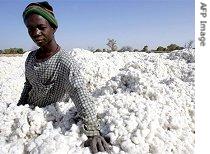2007年VOA标准英语-Burkinabe Cotton Sector Nears Bankruptcy
搜索关注在线英语听力室公众号:tingroom,领取免费英语资料大礼包。
(单词翻译)
By Phuong TranDakar
26 January 2007
Trade ministers are meeting on the sidelines at the World Economic Forum1 meeting in Davos, Switzerland. For the trade ministers, the fate of the so-called Doha talks to slash2 trade subsidies3 has again become a hot topic as G-8 countries assess promises made to help Africa. In West Africa in particular, cotton growers are interested in the talks as their industry now appears close to financial disaster. Phuong Tran reports from VOA's West Africa bureau in Dakar.
Three cotton buying associations in Burkina Faso - one of Africa's top cotton producing countries - say they are near bankruptcy4. They have not paid cotton producers for the 700,000 tons of cotton purchased in 2006.
 |
| A Burkinabese farmer stands by cotton bolls in Pama, central Burkina Faso, 22 Jan 2007 |
Cotton farmer Seydou Ouedrago says business has been slow as he waits for his payment.
"We live by cotton. It would be so easy for them to lift their subsidies," he said. "If cotton producers are not able to make a living, how are we supposed to take our children to school? How do we cure our children when they are sick? How do we feed them? How can we give them a better life than we had? We already live on less than one dollar per day. "
But the U.S. trade representative for Africa, Flori Liser, says that doing away with subsidies alone cannot solve the problems of Africa's farmers.
"One reason you continue to hear the clamor because frankly5 it is a political issue, it is a good sound bite to say that U.S. subsidies are affecting the farmers. But there are a whole range of other issues," she said.
She says that the middlemen in Africa are part of the problem because they charge prices that do not allow the producers to cover costs. She also says other developing nations have higher yields of cotton than Africans because they use irrigation systems and fertilizers.
The United States has already agreed to repeal6 major cotton subsidies as a result of a case that Brazil brought against it in the World Trade Organization. But the repeal does not go into full effect for another six years.
U.S. trade representative Liser says that the United States will continue to provide its farmers with some subsidies until other countries agree to do away with theirs, which was one issue that stalled the Doha trade talks last year.
Four of Africa's major cotton producers, Benin, Burkina Faso, Chad and Mali, known as the C-4 countries, appealed to the World Trade Organization for compensation from rich countries until these subsidies are completely eliminated.
The U.S. recently announced that it will give farmers in Senegal and the C-4 countries $27 million over three years for cotton reform initiatives. But Burkinabe cotton farmer Ouedrago says this is not enough.
"We recognize the [U.S.] gesture, but the money is not enough to cover our losses caused by subsidies," he said. "This is simply a way of masking the real problem."
Experts say the World Trade Organization's Doha round needs a breakthrough in the next few months if U.S. lawmakers are to renew the Bush administration's trade negotiating powers, due to expire in July. Without a breakthrough, the talks could be delayed for years or even collapse7. Supporters of the talks say if there is a collapse their hopes of easing poverty in developing world would suffer a serious blow.
 收听单词发音
收听单词发音 




